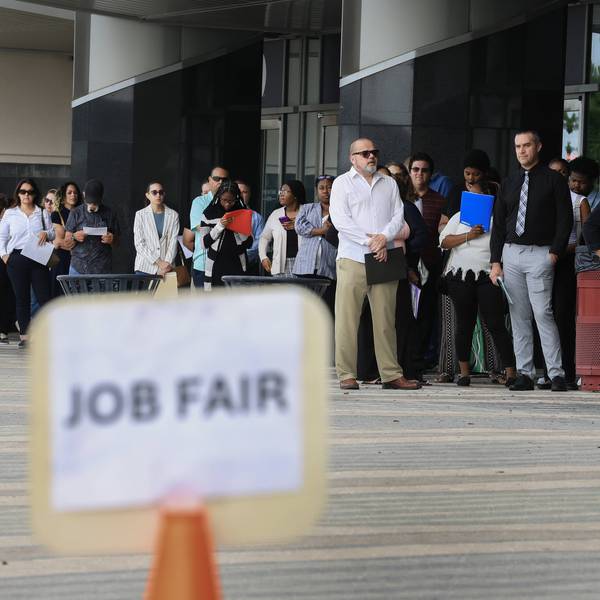Jobs Report Shows How Romneynomics Would Hurt the Recovery
Today's jobs numbers don't look good. The economy added only 69,000 jobs and the unemployment rate stands at a painful 8.2 percent, little changed from previous months. And the news for government workers continues to be grim. Another 13,000 were thrown off the payrolls in May, adding up to a total 650,000 public sector jobs lost since the official end of the recession in June 2009.
Today's jobs numbers don't look good. The economy added only 69,000 jobs and the unemployment rate stands at a painful 8.2 percent, little changed from previous months. And the news for government workers continues to be grim. Another 13,000 were thrown off the payrolls in May, adding up to a total 650,000 public sector jobs lost since the official end of the recession in June 2009.
This might be awkward news for Mitt Romney, who earlier this week called for even more pain for public workers. He told a group of supporters in Colorado on Tuesday that government employees should give up their jobs for those who work in the private sector. In talking about President Obama's stimulus package, he said:
That stimulus he put in place, it didn't help private sector jobs, it helped preserve government jobs, and the one place we should have cut back was on government jobs. We have a 145,000 more government workers under this president. Let's send them home and put you back to work!
Whether or not those are accurate numbers, Romney wants to amplify the misery of more than a half million unemployed public workers by putting another 145,000 out of work.
But if Romney wants to talk job creation and getting our economy out of this rut, he may have to take another look at this line of thinking. As Mike Konczal and I reported in March, Paul Krugman has estimated that unemployment would be closer to 7 percent if the government workforce had grown instead of cratering. While other economists might quibble over the exact impact these job losses have had on the economy, many agree that it's a big part of what's holding us back from a robust recovery.
There's another awkward aspect of these numbers for the Romney camp. Remember when he was running around saying that Obama had overseen huge job losses among women? He may have been right about the fact that women have disproportionately suffered during the recovery period (even if his math was a bit fuzzy), but he failed to take a look at why those job losses occurred. This month's jobs report holds a clue: of those 13,000 public sector jobs lost, over half--7,000--were in "state government education" and "local government education." In other words: teachers. Massive teacher layoffs, particularly elementary school teachers, are a big part of why women have lost nearly 400,000 public sector jobs in the recovery. If men were sunk by a collapsing housing market during the recession, women have been hammered by public sector layoffs.
Romney's not the only Republican to think that slashing government payrolls will somehow stem job losses and improve the economy. Mike and I pointed out that these job losses have not only occurred almost entirely at the state level, but they were at the hands of ultraconservative legislators elected in the Tea Party wave of 2010. If any politician wants to get serious about getting the economy humming again, he or she will have to confront the drag created by public sector workers' being out of a job.
An Urgent Message From Our Co-Founder
Dear Common Dreams reader, The U.S. is on a fast track to authoritarianism like nothing I've ever seen. Meanwhile, corporate news outlets are utterly capitulating to Trump, twisting their coverage to avoid drawing his ire while lining up to stuff cash in his pockets. That's why I believe that Common Dreams is doing the best and most consequential reporting that we've ever done. Our small but mighty team is a progressive reporting powerhouse, covering the news every day that the corporate media never will. Our mission has always been simple: To inform. To inspire. And to ignite change for the common good. Now here's the key piece that I want all our readers to understand: None of this would be possible without your financial support. That's not just some fundraising cliche. It's the absolute and literal truth. We don't accept corporate advertising and never will. We don't have a paywall because we don't think people should be blocked from critical news based on their ability to pay. Everything we do is funded by the donations of readers like you. Will you donate now to help power the nonprofit, independent reporting of Common Dreams? Thank you for being a vital member of our community. Together, we can keep independent journalism alive when it’s needed most. - Craig Brown, Co-founder |
Today's jobs numbers don't look good. The economy added only 69,000 jobs and the unemployment rate stands at a painful 8.2 percent, little changed from previous months. And the news for government workers continues to be grim. Another 13,000 were thrown off the payrolls in May, adding up to a total 650,000 public sector jobs lost since the official end of the recession in June 2009.
This might be awkward news for Mitt Romney, who earlier this week called for even more pain for public workers. He told a group of supporters in Colorado on Tuesday that government employees should give up their jobs for those who work in the private sector. In talking about President Obama's stimulus package, he said:
That stimulus he put in place, it didn't help private sector jobs, it helped preserve government jobs, and the one place we should have cut back was on government jobs. We have a 145,000 more government workers under this president. Let's send them home and put you back to work!
Whether or not those are accurate numbers, Romney wants to amplify the misery of more than a half million unemployed public workers by putting another 145,000 out of work.
But if Romney wants to talk job creation and getting our economy out of this rut, he may have to take another look at this line of thinking. As Mike Konczal and I reported in March, Paul Krugman has estimated that unemployment would be closer to 7 percent if the government workforce had grown instead of cratering. While other economists might quibble over the exact impact these job losses have had on the economy, many agree that it's a big part of what's holding us back from a robust recovery.
There's another awkward aspect of these numbers for the Romney camp. Remember when he was running around saying that Obama had overseen huge job losses among women? He may have been right about the fact that women have disproportionately suffered during the recovery period (even if his math was a bit fuzzy), but he failed to take a look at why those job losses occurred. This month's jobs report holds a clue: of those 13,000 public sector jobs lost, over half--7,000--were in "state government education" and "local government education." In other words: teachers. Massive teacher layoffs, particularly elementary school teachers, are a big part of why women have lost nearly 400,000 public sector jobs in the recovery. If men were sunk by a collapsing housing market during the recession, women have been hammered by public sector layoffs.
Romney's not the only Republican to think that slashing government payrolls will somehow stem job losses and improve the economy. Mike and I pointed out that these job losses have not only occurred almost entirely at the state level, but they were at the hands of ultraconservative legislators elected in the Tea Party wave of 2010. If any politician wants to get serious about getting the economy humming again, he or she will have to confront the drag created by public sector workers' being out of a job.
Today's jobs numbers don't look good. The economy added only 69,000 jobs and the unemployment rate stands at a painful 8.2 percent, little changed from previous months. And the news for government workers continues to be grim. Another 13,000 were thrown off the payrolls in May, adding up to a total 650,000 public sector jobs lost since the official end of the recession in June 2009.
This might be awkward news for Mitt Romney, who earlier this week called for even more pain for public workers. He told a group of supporters in Colorado on Tuesday that government employees should give up their jobs for those who work in the private sector. In talking about President Obama's stimulus package, he said:
That stimulus he put in place, it didn't help private sector jobs, it helped preserve government jobs, and the one place we should have cut back was on government jobs. We have a 145,000 more government workers under this president. Let's send them home and put you back to work!
Whether or not those are accurate numbers, Romney wants to amplify the misery of more than a half million unemployed public workers by putting another 145,000 out of work.
But if Romney wants to talk job creation and getting our economy out of this rut, he may have to take another look at this line of thinking. As Mike Konczal and I reported in March, Paul Krugman has estimated that unemployment would be closer to 7 percent if the government workforce had grown instead of cratering. While other economists might quibble over the exact impact these job losses have had on the economy, many agree that it's a big part of what's holding us back from a robust recovery.
There's another awkward aspect of these numbers for the Romney camp. Remember when he was running around saying that Obama had overseen huge job losses among women? He may have been right about the fact that women have disproportionately suffered during the recovery period (even if his math was a bit fuzzy), but he failed to take a look at why those job losses occurred. This month's jobs report holds a clue: of those 13,000 public sector jobs lost, over half--7,000--were in "state government education" and "local government education." In other words: teachers. Massive teacher layoffs, particularly elementary school teachers, are a big part of why women have lost nearly 400,000 public sector jobs in the recovery. If men were sunk by a collapsing housing market during the recession, women have been hammered by public sector layoffs.
Romney's not the only Republican to think that slashing government payrolls will somehow stem job losses and improve the economy. Mike and I pointed out that these job losses have not only occurred almost entirely at the state level, but they were at the hands of ultraconservative legislators elected in the Tea Party wave of 2010. If any politician wants to get serious about getting the economy humming again, he or she will have to confront the drag created by public sector workers' being out of a job.

